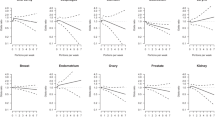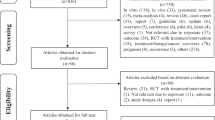Abstract
In a hospital-based case-control study of endometrial cancer undertaken in Athens (1992-94), 145 women residents of Greater Athens with confirmed cancer of the endometrium were compared with 298 control patients with orthopaedic diseases. Personal interviews were conducted in the hospital setting, and diet was assessed using a validated semiquantitative food frequency questionnaire. Nutrient intakes for individuals were calculated by multiplying the nutrient intake of a typical portion size for each specified food item by the frequency at which the food was consumed per month and summing these estimates for all food items. Data were modelled through logistic regression, controlling for demographic, reproductive and somatometric risk factors for endometrial cancer as well as for total energy intake. No macronutrient was significantly associated with endometrial cancer risk, but increasing intake of monounsaturated fat, mostly olive oil, by about one standard deviation was associated with a 26% risk reduction (odds ratio = 0.74; 95% confidence interval 0.54-1.3). Among micronutrients, only calcium intake was significantly inversely associated with endometrial cancer risk, whereas there was evidence against retinol and zinc imparting protection against the disease. With respect to food groups, there was weak and non-significant evidence that vegetables are protective, whereas consumption of pulses was positively associated with disease possibly because they contribute substantially in Greece to energy intake in excess of physical activity-dependent requirements.
This is a preview of subscription content, access via your institution
Access options
Subscribe to this journal
Receive 24 print issues and online access
$259.00 per year
only $10.79 per issue
Buy this article
- Purchase on Springer Link
- Instant access to full article PDF
Prices may be subject to local taxes which are calculated during checkout
Similar content being viewed by others
Author information
Authors and Affiliations
Rights and permissions
About this article
Cite this article
Tzonou, A., Lipworth, L., Kalandidi, A. et al. Dietary factors and the risk of endometrial cancer: a case - control study in Greece. Br J Cancer 73, 1284–1290 (1996). https://doi.org/10.1038/bjc.1996.246
Issue Date:
DOI: https://doi.org/10.1038/bjc.1996.246
This article is cited by
-
The influence of dietary vegetables and fruits on endometrial cancer risk: a meta-analysis of observational studies
European Journal of Clinical Nutrition (2023)
-
Dietary total antioxidant capacity in relation to endometrial cancer risk: a case–control study in Italy
Cancer Causes & Control (2016)
-
Dietary fat intake and endometrial cancer risk: dose-response meta-analysis of epidemiological studies
Scientific Reports (2015)
-
Proanthocyanidins and other flavonoids in relation to endometrial cancer risk: a case–control study in Italy
British Journal of Cancer (2013)
-
Consumption of sugary foods and drinks and risk of endometrial cancer
Cancer Causes & Control (2013)



